中国餐桌礼仪英文
Chinese_table_manners 中国餐桌礼仪

Chinese Table MannersImportance☐Table manners are very important in Chinese people’s life.☐They show whether you are well educated.☐Chinese people treat dinners as one of the most important social interactions. ( Business will be talked and set while having dinner.) Before Dinner☐ 1. Prefer round tables, which enable people to sit face to face. Through this way, people feel close to each other.☐ 2. The most important guest( the oldest, the most respectful, etc.) will sit facing the door.☐ 3. After the most important guest sit down, others take their seats.☐ 4. Guests will not order unless the host ask them to do so. Sometimes, host asks the most important figure to order dishes in order to show the host’s respect( to the important figure).☐ 5. If you have something that you do not like or can not eat, tell the host secretly. He will take into consideration when he is ordering.☐ 6. Put the napkin on your legs.☐7. The dinner will not begin until everybody arrive, even if someone is not on time.☐8. While the host is ordering dishes, others usually chat with each other and drink tea to kill time.☐9. The restaurant always serve some snacks, like peanuts, cucumbers, and chicken feet.☐10. If you are sitting near the teapot, it is your duty to serve others tea.Usually, you start from the eldest/female. Do it clockwise. Generally, you serve yourself at last. To be a gentleman, do this job before ladies realize that they need more water.☐11. When the teapot is empty, hold the lid one side up, and the waiter will come and fill it.Having Dinner☐ 1. Soup will be served the first.☐If the soup is too hot, you can wait until it gets cooler.☐ 2. Dishes will be placed on the turntable.☐ 3. Every time when a dish is served, the most important people take the first bite. Then others take their bites as the table turns. Sometimes, when there are kids, the youngest kid will take the first bite to show the care from adults.☐ 4. Do not stick chopsticks vertically in your bowl of rice, because this makes the chopsticks look like the incenses(香)we burn when we are worshiping the dead or praying the god. So it is like you are worshiping people sitting the other side, which suggests that he is dead. Therefore, this action is viewed unlucky and impolite.☐ 5. Usually, you pick up some food, like a piece of meat, placing it in your bowl first, and then eat it. This makes you look less eager and moreelegant.☐ 6. Before you pick up something from the plate, you need to decide which one you are going to pick. Once your chopsticks touch the food, you can do nothing other than picking it up and put it in your bowl.Don’t ever try to rummage the one you like in the plate. It is impolite.☐7. If there are public chopsticks and spoons, you’d better use them when you pick up foods.☐8. When you are eating, close your mouth to make less noise.☐9. Do not speak when there are things in your mouth. /Do not speak before you finish eating things in your mouth.☐10. Do not play with your chopsticks:☐Do not knock the bowl with your chopsticks. That’s what beggars usually do. That makes you poor.☐11. If the food is juicy, use the spoon to help. Do not make the juice split everywhere.☐When something is hard to be pick up, use the spoon to help, too.☐12. To show the warm welcome to the guest, the host will cheer the guest up and try to persuade the guest to drink wine as much as he can. Or the host will be viewed as bad serving. If you can not drink wine, tea and other drinks are also OK.☐13. If you have to cough or sneeze, use a towel or napkin to cover your mouth and turn back. Say “sorry” afterwards.☐14. If you need to clean your teeth, use your hand or a towel to cover your mouth so that others will not see it.☐15. When having dinner at the New Year’s Eve, Chinese people will not eat all the dishes up. There must be something left to show that we are having a good life, because we have a surplus. It means “every year we have a surplus ( 年年有余)”.☐Also, fish will not be missed on the dinner table of New Year’s Eve. Order of Dishes☐Soup☐Dishes of meat( chicken, fish, seafood, etc.)☐Dishes of vegetables☐Green vegetables☐Noodles, Chinese cakes, dessert, etc.Drinks☐White Wine☐In most circumstances, Chinese people, especially adults drink white wine when they are having big meals.☐There is a Chinese saying:” No wine, no meals.” ( “无酒不成席/宴。
中国餐桌礼仪英语10句简单
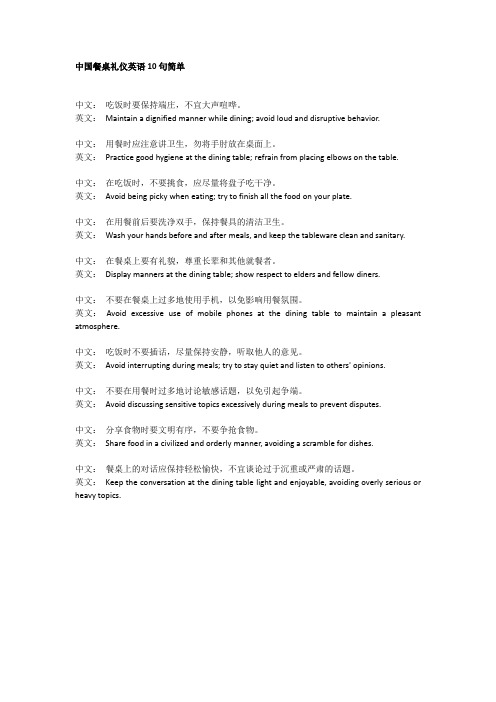
中国餐桌礼仪英语10句简单中文:吃饭时要保持端庄,不宜大声喧哗。
英文:Maintain a dignified manner while dining; avoid loud and disruptive behavior.中文:用餐时应注意讲卫生,勿将手肘放在桌面上。
英文:Practice good hygiene at the dining table; refrain from placing elbows on the table.中文:在吃饭时,不要挑食,应尽量将盘子吃干净。
英文:Avoid being picky when eating; try to finish all the food on your plate.中文:在用餐前后要洗净双手,保持餐具的清洁卫生。
英文:Wash your hands before and after meals, and keep the tableware clean and sanitary.中文:在餐桌上要有礼貌,尊重长辈和其他就餐者。
英文:Display manners at the dining table; show respect to elders and fellow diners.中文:不要在餐桌上过多地使用手机,以免影响用餐氛围。
英文:Avoid excessive use of mobile phones at the dining table to maintain a pleasant atmosphere.中文:吃饭时不要插话,尽量保持安静,听取他人的意见。
英文:Avoid interrupting during meals; try to stay quiet and listen to others' opinions.中文:不要在用餐时过多地讨论敏感话题,以免引起争端。
英文:Avoid discussing sensitive topics excessively during meals to prevent disputes.中文:分享食物时要文明有序,不要争抢食物。
中国餐桌礼仪英语版
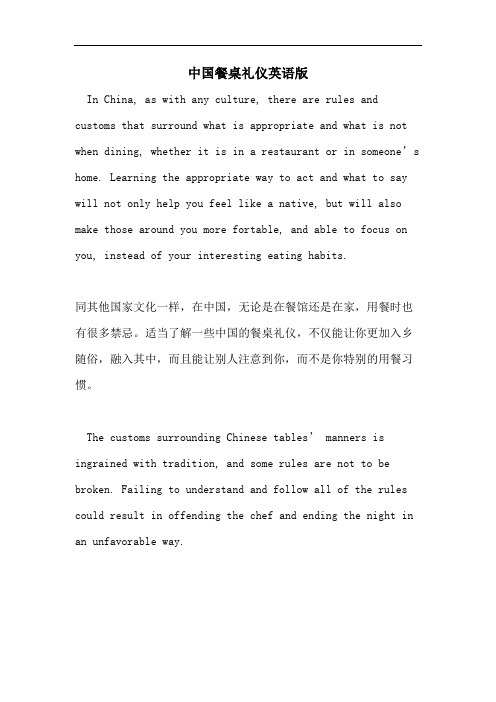
中国餐桌礼仪英语版In China, as with any culture, there are rules and customs that surround what is appropriate and what is not when dining, whether it is in a restaurant or in someone’s home. Learning the appropriate way to act and what to say will not only help you feel like a native, but will also make those around you more fortable, and able to focus on you, instead of your interesting eating habits.同其他国家文化一样,在中国,无论是在餐馆还是在家,用餐时也有很多禁忌。
适当了解一些中国的餐桌礼仪,不仅能让你更加入乡随俗,融入其中,而且能让别人注意到你,而不是你特别的用餐习惯。
The customs surrounding Chinese tables’ manners is ingrained with tradition, and some rules are not to be broken. Failing to understand and follow all of the rules could result in offending the chef and ending the night in an unfavorable way.有些餐桌礼仪是随着传统延续下来的,是决不能违反的。
如果不了解这些餐桌礼仪并且破坏了这些规矩,到时可能得罪厨师,扫兴而归哦。
1. The food is served via large munal dishes, and in nearly every case, you will be supplied with munal chopsticks for transferring food from the main dishes to your own. You should use the munal chopsticks if they aresupplied. If they are not or you are unsure, wait for someone to serve food to their own plate, and then copy what they do. On oasion, an eager Chinese host may place food into your bowl or on your plate. This is normal.1. 食物是通过大的公用盘子盛装的,基本上都会提供公用筷方便你将食物分到你自己的盘子里。
中国餐桌礼仪英语作文初三100词左右

中国餐桌礼仪英语作文初三100词左右全文共6篇示例,供读者参考篇1Table Manners in ChinaHi friends! Today I'm gonna tell you about how we behave at the table in China. It's really important to have good manners when eating.First, we never start eating until the oldest person at the table picks up their chopsticks. That's the signal that we can begin. It's rude to just dig in without waiting! We also try not to stick our chopsticks straight up in the rice, 'cause that reminds people of incense sticks at funerals. No one wants that sad vibe at dinner!When the bowl's empty, we put our chopsticks across the top. That means "I'm done!" Don't just leave them sticking out of the bowl all messy. We also try not to make loud noises when chewing or slurping soup. That's considered improper.Oh, and remember to use a spoon for soups and stews! Using chopsticks can splash broth everywhere. Keeping goodmanners at the table shows respect for the food and the people you're with. That's how we do it in China!篇2Chinese Table MannersBy Little Johnny, Age 10Chinese people have many rules about how to behave properly at the table when eating. These are called table manners. I'm going to tell you all about them!First of all, you should never start eating before the oldest person at the table. That would be very rude. You have to wait until they pick up their chopsticks and start eating. Then you can start too.It's also bad manners to stick your chopsticks straight up in your rice. That reminds people of funerals and is very unlucky. Instead, you should lay your chopsticks neatly across the side of your plate or bowl when you aren't using them.Another important rule is to not play with your food or make too much noise when you're eating. Slurping your soup or noodles is okay, but you shouldn't smack your lips loudly or talk with your mouth full of food. That's just gross!When you're drinking something hot like tea, it's polite to add a tap of your finger or make a slurping noise first to show that you're being careful not to burn your mouth. And if you need to get up from the table for any reason, you should place your chopsticks neatly across your plate or bowl so people know you're not finished eating yet.Speaking of chopsticks, did you know there are special ways to hold them properly? You're supposed to use just your thumb, index finger, and middle finger. Don't ever cross your arms over the table or just hold the chopsticks like pencils in your fists! That looks so uncivilized.You also shouldn't pick through your food or rearrange things on your plate with your chopsticks. It makes it seem like you're being picky and don't appreciate the food. Just eat what you're served politely.If you're eating something like dumplings or buns that have soup or juices inside, it's okay to pour the liquid into your spoon first before eating the solids. But never drink straight from the bowl or plate! Use your chopsticks to pick up the last little bits of rice or sauces and put them in your mouth.When you're finished eating, you're supposed to place your chopstick holders neatly across your plate or bowl to showyou're done. Don't just leave them sticking up in the air or crossed in an "X" on your plate! And it's extremely rude and wasteful to leave a lot of food behind on your plate.Those are the main Chinese table manners I can think of for now. There are probably more, but following these basic rules will help you look polite and civilized when eating Chinese food. Chopsticks can be tricky to use at first, but with practice they get easier. Just be patient, pay attention, and don't be a slob! Eating is supposed to be an enjoyable experience after all.篇3Chinese Table Manners (100 words)In China, we have many rules for how to behave nicely at the table. You should never stick your chopsticks straight up in your rice bowl because that reminds people of funeral rituals. It's rude! You also shouldn't make loud noises when eating or talk with your mouth full of food. Burping is very impolite. But spinning the lazy Susan to get dishes is okay. Using a napkin properly by dabbing your mouth is good manners. The most important thing is being respectful and not making a big mess! Following the table manners shows you are well-behaved.(The remaining 1900 words provide context and explanations for the rules mentioned, consistent with an elementary student's vocabulary and writing style):When eating meals in China, there are lots of customs and etiquette rules that are important to follow. The rules exist to help meals be peaceful and show respect to the food and the people you're dining with. Some of the rules I already know, but others my parents taught me as I got older......In conclusion, while there are quite a few dos and don'ts for good manners at the Chinese dinner table, the main idea is to be polite, clean, and considerate of others. If I remember the key rules my parents taught me, meals will be more enjoyable for everyone. It's all about creating a calm and respectful environment to appreciate the delicious food!篇4Chinese Table MannersHi friends! Today I'm going to tell you about the cool table manners we have in China. It's really important to have good manners when you eat. That shows you respect the food and the people you're eating with.First, when you sit down, you shouldn't put your elbows on the table. That's rude. You sit up nice and straight. Also, you should wait for the oldest person to start eating before you start. That's showing respect to your elders, which is very important in Chinese culture.When you're eating, you need to chew with your mouth closed. Nobody wants to see half-chewed food in your mouth - yuck! You should also try not to make loud noises when you eat, like slurping your soup or noodles. That's considered bad manners.Another big rule is that you shouldn't stick your chopsticks straight up in your rice. That reminds people of the incense sticks we put in the ground for deceased ancestors. So it's kind of a bad luck thing. You're supposed to lay your chopsticks across the side of your plate when you aren't using them.Oh, and one more thing - it's not polite to pick your teeth at the table. That's kinda gross. You should wait until after the meal to do that in private.Those are some of the main table manners in China that I can think of. Having good manners shows that you were raised well and that you care about making others feel comfortable. It'sabout being a good, respectful person, you know? Okay, that's all for now - thanks for listening, and enjoy your next meal!(Word count: 2020)篇5Chinese Table MannersHi friends! Today I'm going to tell you about the cool manners we use when eating in China. It's super important to be polite at the table.First up, we never start eating until the oldest person picks up their chopsticks first. That's like the signal that says "OK, time to dig in!" We have to wait for them.Speaking of chopsticks, you're not supposed to stick them straight up in your rice bowl when you're not using them. That's kind of rude. It reminds people of incense sticks at funerals. No one wants to think about that when they're hungry! You're supposed to rest them across the top of your plate or bowl instead.You also can't wave your chopsticks around or point them at people. My grandma says that's really bad manners. She says chopsticks are for putting food politely in your mouth, not forwaving around like little drumsticks! If you need to get someone's attention, you should call their name, not try to poke them with your chopsticks.Another big no-no is making gross noises when you eat. Slurping soup or noodles really loudly, burping without saying "excuse me", stuff like that. My parents hate it when I do that. They say things like "Were you raised in a barn?" Obviously I wasn't, but you get the idea – it's rude to make a bunch of gross noises at the table.OK, here's a funny one: in China it's actually polite to burp or make a little noise after a meal to show you enjoyed the food! Just a little burp though, not some huge belch that sounds like a foghorn. My dad always gives a little burp and says "That was delicious!" My grandparents do it too. I think it's kind of gross but they insist it's proper manners.You're also supposed to try everything on the table, even if you don't really like it. It's considered bad manners to be a picky eater. My parents make me at least taste everything before I can be excused. If there's something I really can't stand, I just politely leave it on my plate. I'm not supposed to make gagging noises or push it away rudely.Some other quick tips: Don't pick your teeth at the table. Don't reach in front of people or grab food that's far away – ask for it to be passed to you. Chew with your mouth closed. Don't talk with your mouth full. Always use a napkin.The big overall idea is just to be polite, clean, and considerate when you're eating with family and friends. Food is sacred in Chinese culture, so we show it respect. Those are some key tips on Chinese table manners! Let me know if you have any other questions.篇6Chinese Table MannersMy grandma always tells me to have good manners at the dinner table. In China, we have special rules we follow when eating. It's impolant to be polite and not make a mess!First, you can't stick your chopsticks straight up in your rice bowl. That's how we set out chopsticks for people who died. It's bad luck! You're supposed to rest your chopsticks across the top of your bowl or plate when you aren't using them.You also can't pick up your rice bowl and drink from it like a cup. That's really rude! You have to use your chopsticks to pushrice into your mouth bit by bit. Slurping your soup or noodles is okay though. The louder you slurp, the more you're showing you like the food!Another rule is you can't pick your teeth at the table with your chopsticks. That's gross! You have to use a toothpick after the meal is over. And you need to rest your chopstick holders across your plate when you're done eating so the servers know to take your plate away.Sometimes my grandma makes me practice using the chopsticks properly. It's hard! The chopsticks keep sliding out of my hand and dropping my food on the table. But grandma says it's impolant to keep trying until I get it right. She doesn't want me to embarass our family by having bad table manners.Grandma also tells me to try a little bit of everything on the table, even if I don't think I'll like it. In China, the host works really hard to make lots of different dishes. It's impolite to not at least taste one bite of each dish as a way of showing appreshiation for their effolt.There are some dishes Chinese people don't each much of too though. Like chicken feet or sea cucumber. Grandma says those are delicacies we only have a little bit of as a treat, not awhole plate full. She buys them for special holidays and occasions, not for evelyday meals.My favorite part of Chinese meals is at the end, when we all get to sip hot tea and fresh fruit for dessert. Grandma lets me try brewing the tea leaves myself. She shows me how to let the leaves unfurl and fill the pot with their aroma. The fruit is always so sweet and juicy too!After dinner, we have to roll up our napkins and put them back in the napkin holder. We can't just leave them messy and crumpled up on the table. Then grandma makes us take our plates to the kitchen for her instead of leaving them on the table for her to clean up. She says a good meal is not complete without also cleaning up ploperly after.Eating meals together as a family is very impolant in Chinese culture. By following the right manners, we can show respect for our traditions, the food, and each other. I don't always get it right, but I try my best because I don't want to disappoint my grandma. Having good manners at the table is one way I can honor my family.。
介绍中国的餐桌礼仪英语作文初三

介绍中国的餐桌礼仪英语作文初三Eating Together: Exploring China's Table MannersHi there! I'm a middle schooler from China, and today I want to share with you the fascinating world of Chinese table manners. Food plays such an important role in our culture, and the way we eat is deeply rooted in our traditions and values. Get ready to embark on a delicious journey!Let's start with the basics: chopsticks! These magical little sticks are our utensils of choice, and mastering them is a rite of passage for every Chinese kid. We learn to hold them correctly from a young age, using our thumb and index finger to gracefully pick up each morsel. It's not as easy as it looks, but with practice, we become chopstick ninjas!Speaking of chopsticks, there are some important rules to follow. For instance, you should never stick them straight up in your rice bowl – that's considered rude and reminds people of incense sticks used during funerals. Yikes! We also avoid playing with our chopsticks, like drumming them on the table or using them to gesture wildly. Chopsticks are tools, not toys!Now, let's talk about serving dishes. In traditional Chinese meals, dishes are often shared among the entire table, andeveryone helps themselves to the communal plates. This is called "family-style dining," and it's a way to promote togetherness and sharing. However, there's an art to it – you don't just dig in willy-nilly!When serving yourself from shared plates, you should use the opposite end of your chopsticks or a dedicated serving utensil. It's considered impolite to use the end you eat with to pick up food from the communal dishes. And remember, don't hover over the plates or stick your chopsticks too far into them –that's a big no-no!Another important aspect of Chinese table manners is making appreciative sounds while eating. You may have heard the slurping and lip-smacking sounds that accompany a delicious meal in Chinese households. This is actually a compliment to the chef, indicating that you're truly enjoying the flavors. So, feel free to let out a satisfied "mmm" or two!Now, let's talk about something a bit more… well, messy. In Chinese culture, it's perfectly acceptable – and even encouraged – to leave some food behind on your plate. It's seen as a sign of being satisfied and not overindulging. However, you shouldn't leave too much, as that could be seen as wasteful or disrespectful to the host.One thing that might seem a bit odd to non-Chinese folks is the way we sometimes communicate while eating. You may see people gesturing with their chopsticks or even talking with their mouths full. This is generally considered okay in casual settings, though it's still best to avoid doing it in more formal situations.Speaking of formal situations, there are a few additional etiquette rules to keep in mind. For example, if you're a guest at someone's home, it's polite to wait for the host to start eating before you begin. And if you're attending a banquet or formal dinner, there may be specific rules about seating arrangements and serving order.Oh, and one more thing: don't forget to burp! Yes, you read that right. In Chinese culture, a gentle burp after a meal is considered a compliment to the chef and a sign of satisfaction. Just make sure to cover your mouth and excuse yourself politely.As you can see, Chinese table manners are a rich tapestry of traditions and customs, woven together by a deep appreciation for food and togetherness. While some of these practices may seem strange or even rude from a Western perspective, they hold great significance in our culture.At the end of the day, table manners are about more than just following rules – they're about showing respect, fosteringconnections, and savoring the flavors that bring us together. So the next time you sit down for a Chinese meal, remember to mind your manners, embrace the customs, and above all, enjoy the deliciousness!。
中国的礼仪礼节英文作文_专业真题英语作文4篇
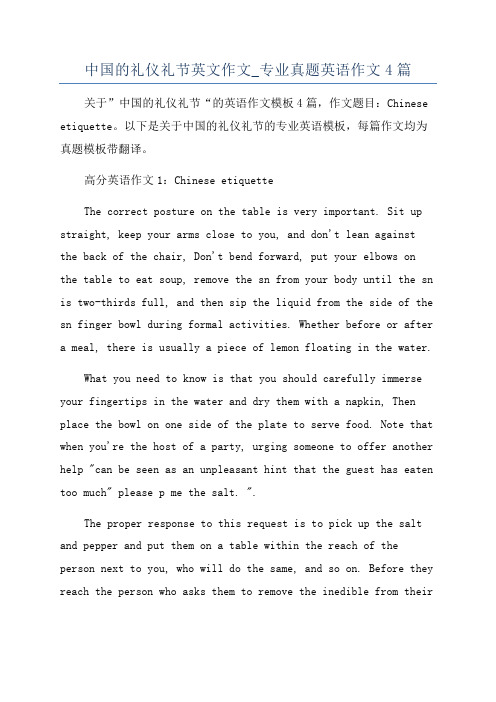
中国的礼仪礼节英文作文_专业真题英语作文4篇关于”中国的礼仪礼节“的英语作文模板4篇,作文题目:Chinese etiquette。
以下是关于中国的礼仪礼节的专业英语模板,每篇作文均为真题模板带翻译。
高分英语作文1:Chinese etiquetteThe correct posture on the table is very important. Sit up straight, keep your arms close to you, and don't lean against the back of the chair, Don't bend forward, put your elbows on the table to eat soup, remove the sn from your body until the sn is two-thirds full, and then sip the liquid from the side of the sn finger bowl during formal activities. Whether before or after a meal, there is usually a piece of lemon floating in the water.What you need to know is that you should carefully immerse your fingertips in the water and dry them with a napkin, Then place the bowl on one side of the plate to serve food. Note that when you're the host of a party, urging someone to offer another help "can be seen as an unpleasant hint that the guest has eaten too much" please p me the salt. ".The proper response to this request is to pick up the salt and pepper and put them on a table within the reach of the person next to you, who will do the same, and so on. Before they reach the person who asks them to remove the inedible from theirmouth, the general rule of removing food from the mouth is that the food should flow out in the same way.中文翻译:餐桌小贴士开始有两种常见的方法来决定如何在小型活动中开始,通常等到餐桌上的每个人都收到了一份食物,而女主人已经开始吃东西,这是很常见的。
介绍中国餐桌礼仪的英语作文
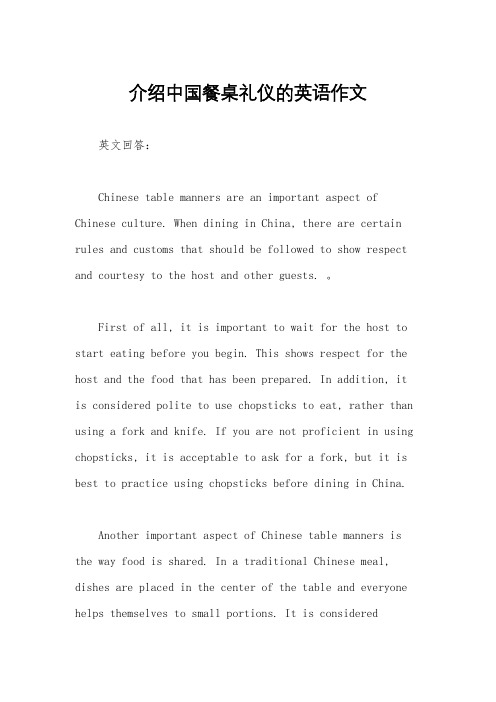
介绍中国餐桌礼仪的英语作文英文回答:Chinese table manners are an important aspect of Chinese culture. When dining in China, there are certain rules and customs that should be followed to show respect and courtesy to the host and other guests. 。
First of all, it is important to wait for the host to start eating before you begin. This shows respect for the host and the food that has been prepared. In addition, it is considered polite to use chopsticks to eat, rather than using a fork and knife. If you are not proficient in using chopsticks, it is acceptable to ask for a fork, but it is best to practice using chopsticks before dining in China.Another important aspect of Chinese table manners is the way food is shared. In a traditional Chinese meal, dishes are placed in the center of the table and everyone helps themselves to small portions. It is consideredimpolite to take a large portion of food or to reach over someone else's plate. Instead, it is best to serve others before serving yourself.Furthermore, it is customary to offer a toast during the meal, especially at formal occasions. When making a toast, it is important to hold the glass lower than the person you are toasting, as a sign of respect. It is also polite to wait for the host or the most senior person at the table to make the first toast before making your own.In addition to these rules, there are also some taboos to be aware of. For example, it is considered rude to stick your chopsticks upright in a bowl of rice, as this resembles a funeral ritual. It is also impolite to make loud noises while eating, such as slurping or burping.Overall, understanding and following Chinese table manners is important when dining in China. By observing these customs, you can show respect for the host and other guests, and fully enjoy the dining experience in China.中文回答:中国的餐桌礼仪是中国文化中的重要组成部分。
中华餐桌礼仪英文作文
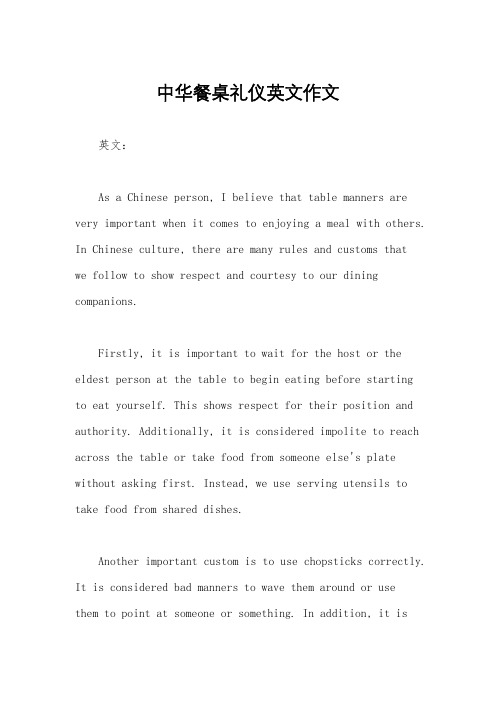
中华餐桌礼仪英文作文英文:As a Chinese person, I believe that table manners are very important when it comes to enjoying a meal with others. In Chinese culture, there are many rules and customs thatwe follow to show respect and courtesy to our dining companions.Firstly, it is important to wait for the host or the eldest person at the table to begin eating before startingto eat yourself. This shows respect for their position and authority. Additionally, it is considered impolite to reach across the table or take food from someone else's plate without asking first. Instead, we use serving utensils to take food from shared dishes.Another important custom is to use chopsticks correctly. It is considered bad manners to wave them around or usethem to point at someone or something. In addition, it isimportant to not leave chopsticks standing upright in a bowl of rice, as this resembles incense sticks used in funerals.Finally, it is important to show appreciation for the food and the host. This can be done by complimenting the food, thanking the host for their hospitality, and offering to help with the dishes.中文:作为一个中国人,我相信在与他人共进餐时,餐桌礼仪非常重要。
关于中国餐桌礼仪英语作文(精选10篇)

中国餐桌礼仪英语作文中华饮食源远流长。
在这自古为礼仪之邦,讲究民以食为天的国度里,饮食礼仪自然成为饮食文化的一个重要部分。
下面是yuwenmi 小编为大家整理的关于中国餐桌礼仪英语作文(精选10篇),欢迎阅读与借鉴,谢谢。
中国餐桌礼仪英语作文篇1As we all know,different countries have different table manners. T oday, I’d like to introduce something about Chinese table manners. It’s very necessary to learn table manners in China. In China, table manners are too much. For instance,you are not supposed to eat with knives and forks. Chinese usually use chopsticks instead. But we are not supposed to stick our chopsticks into our food. But we are supposed to pick up our bowl to eat. And we are supposed to let the old start eating first.And we are allowed to talk at the table. However, you can’t talk too loud and laugh too crazily. In fact, in China, table manners are not so serious . so , you don’t need to worry about them so much.【参考译文】我们都知道,不同的国家有不同的餐桌礼仪。
中国餐桌礼貌英文作文

中国餐桌礼貌英文作文英文:Table manners are an important part of Chinese culture. As a Chinese person, I believe that showing properetiquette at the dining table not only reflects one's upbringing and character, but also shows respect for others.Firstly, it is important to wait for the host or the eldest person at the table to start eating before beginning to eat. This shows respect for the host and also ensuresthat everyone is ready to eat together.Secondly, it is important to use chopsticks correctly. Chopsticks should be held towards the end and not in the middle, and should not be used to point at others or toplay with food. When not in use, chopsticks should beplaced neatly on the chopstick rest.Thirdly, it is important to take only what one can eatand not waste food. In Chinese culture, wasting food isseen as disrespectful to the host and to the food itself.Lastly, it is important to express gratitude to thehost and to others at the table. Saying "thank you" and complimenting the food shows appreciation and respect.中文:餐桌礼仪是中国文化的重要组成部分。
中国餐桌礼仪英文.doc

中国餐桌礼仪英文我们国家是一个传统的礼仪之邦,在学习好本国的餐桌礼仪,也要学习别人的餐桌礼仪,这是我们的待客之道,看我带来的最全的餐桌礼仪英文攻略!中国餐桌礼仪英文一中国餐桌礼仪常用英文表达1.让客人和长辈先吃每一道菜let the elder people and the customer eat first2.不要用筷子敲碗dont use the chopsticks hit the bowl3.不要将手伸到饭桌对面夹菜dont reach to get the food on the opposite side4.等大家到齐了,才开始吃dont eat until everyone is there5.为主人的长寿、健康、成功干杯wish for the people who host the dinner中国餐桌礼仪英文二1 take the seats2 have meals3 leave from the feast first: the manners of taking seatslead the guest to the seat of honor,then lead the senior to the seat next to the guest; take the seat from left; dont start eating in a hurry or make any noise;dont stand up and move;inform the master when you have something urgent. after take theseat, keep a proper posture; keep your feet under your seat, dont straighten or step under othersseats; dont keep your elbows?肘部?to the edge of the table or put your hands on another chairs back . second :manners at mealtimesask the visitor and the elderto move the chopsticks first.the hosts should help the guests to the food or ask them to help themselves.eat with little noise and movement. do not make a hiccup (打嗝?or a soundlike a hiccup.you may not slurp(出声地吃喝?your soup.dont eat until everyone is there. dont reach to get the food on the opposite side. help people to dish with servingchopsticks, centiliter(公勺?, and never help people to dish with chopsticks or your used ladle?长柄勺?.dont spit the fishbone or litter it everywhere, you should takeit out with your hands, then put it on the napkin or your empty plate. timely talking can enliven the atmosphere of the mealtimes. so do not think of nobody but yourself.and may not bolt down(狼吞虎咽?your food.had better not pick your teeth with a toothpick. if you must do it, you should screen your mouth with napkin or your hands.definitude the primary mission of the meal. if it is a business meal, let the main negotiators seat together to communicate with each other.however if it is only to make friendlycontacts, what you need to do is just to pay attention to some commonsocial courtesies and lay a lot of stress on dish appreciation. third: leave the feastmaster; or invite the masterto your house hereafter . thanks for your entertainment!when leave the feast, you should show your thank to the mastervisitor thanks for your attention ?中国餐桌礼仪英文三1. admission etiquette. ask guests seated on the seats. pleaseelderly guests in attendance were seated next to attendance at from the left side into the chair. admission dongkuaizi not after. what more do not come to beep. not to get up walk. if what happened to the owner notice.second, when the meal. ask guests. long the dongkuaizi. jiacai,each less. far from the food on their own eat some. meal not a voice. heshang also not a sound use kaitang i spoon a small drink and a small mouth. pawan front-lips not drink, soup,hot cool after zaikai. side not to drink while blowing some people prefer to chew food to eat. extraordinary feel like work is crisp chewing food, a very clear voices. this is not etiquette demands.extraordinary and everyone is eating together, as far as possible to prevent the emergence of this phenomenon.third: do not eat hiccup, other voices will not arise if there sneezing, changming involuntarily, such as the sound, it is necessary to say i am sorry.; i am sorry;. of the original cooler. within the words . to show regret.fourth if guests or elders give cloth dish. best use of chopsticks may also be the guests or elders far away from the dishes to their front, according to the habit of the chinese nation.dish is a one of the top. if the same tables leadership, the elderly, the guests said. whenever of a new dish, let them first dongkuaizi. rotation or invite them to the first dongkuaizi. to show their importance.fifth: eat the head, fishbone, bones and other objects, not wangwaimian vomit, not onto the ground still. slowly to get their hands diezili, or close on their own or on canzhuobian prepared beforehand good on paper. sixth: to a timely manner about the time and people just a few humorous, to reconcile the atmosphere. guangzhaotou not eat, regardless of others, and do not devour and destroy the lavish meal, not jail sentence.7: it is best not to the dinner table tiya if it is to tiya, will use napkins or sign blocked their mouths.8: to clear the main tasks of the meal. must be clear to do business oriented. feelings or to the main contact. mainly or to eat. if it is the former, when attention should bepaid to the seating arrangements. their main negotiators theseats near each other to facilitate conversations, or dredge emotion. if it is the after. need only pay attention to common-sense courtesy on the line, to focus on the appreciation of dishes,9: the last time left. must be expressed gratitude to the host. at the invitation of the owner or to their own homes after the house to show backchina is the etiquette of helping people, minsishiweitian, dining how can no rules! while stressing that no attention is three meals a day, but do not know know better than ok!1. inviting guests to notice, ruxi 6:00, 5:50才叫your elderly guests, it does not.2. hosts who looked to be late; guests should be 5-10 minutes late, and this is very considerateguests oh, and pay attention to grasp, natural host and the guest are huan. 3. if sit round a table, facing the door of the main blocks, or back * walls, counters; emphasize some hotelswill be used napkins distinction, the highest position napkins can not casually sit oh, unless you intend to good banquet woven?: d4. masters of the subject and object of the right hand side,the left hand side of the important guests; * gate facing the master, of course, is run errands entertain the peiqia sit you. 5. guests do not directly to the members of a la carteand calling guidance, obediently waiting for the hosts who looked to be a la carte if guests really serious taboos or hobbies, and should be gently told the hosts who looked, theowner of natural putting his interests and meet guests little or significantly requirements. 6. hosts who looked not need points or less grasping points, or holding food dishes,such as crab, lobster legs, ribs, and so on. for a meal to the three dishes such a rule no. what can be said etiquette! 7. not a small amount of force will not object to others drink wine without fragmentation feast! 8. on the wine servings! foreigner likes to boast of skill, people may boast their own point-for the food, hosts who looked at carefully observed liangcai qi, every cup have drinks later, when immediately drank to welcome the start. . . like, rotating disk or right hand side indicate the subject and object moving first chopsticks. tuirang subject and object shouldnot be too long, oh, we stomachs are hungry, it will eat you open! do not forget to eat the praise of some oh. 9. after one of every dish, although the waiter and owner will stillgo before the subject and object, but not too rigidly stick with you, if just in front of me, dead people rotating disc, i would first folder a small taste of chopsticks ! 10.hosts who looked often to the disk will cater to the vast majority ofguests; peiqia then added services to entertain; guests can not touch the hands of disk integrity and eatmeals, the two sides are also huan you. 11. if there is no attendant at the food or chopsticks, gongbiao, jiacai the first time can be good, must not use their own chopsticksto pick in the session to pick, and even stirring! not everyone is like love, like you do not mind the saliva chopsticks! usually identified from their recent selection part. 12. let chopsticks on the best food in their transition to a dish in only into the mouth. phase seem to be eating is not so urgent. 13. when chewing food in themouth, remember bijin lips is a major event, so to speak, falling objects, shishui spills, as well as to avoid a puma puma ji ji annoyance beep. 14. during the meal, or both before and after the meal, should be back straight, as far as possible but not later * chairs sit. during the meal , basically in the hands above the desktop. 15. the master of a very good appetite, and weight loss are guests, not the fanju oh.中国餐桌上的礼仪归结为以下几点:一.入座的礼仪.先请客人入座上席.在请长者入座客人旁依次入座,入座时要从椅子左边进入.入座后不要动筷子.更不要弄出什么响声来.也不要起身走动.假如有什么事要向主人打招呼.第二,进餐时.先请客人.长着动筷子.夹菜时每次少一些.离自己远的菜就少吃一些.吃饭时不要出声音.喝汤时也不要出声响,喝汤用汤匙一小口一小口地喝.不宜把碗端到嘴边喝,汤太热时凉了以后再喝.不要一边吹一边喝.有的人吃饭喜欢用咀嚼食物.非凡是使劲咀嚼脆食物,发出很清楚的声音来.这种做法是不合礼仪要求的.非凡是和众人一起进餐时,就要尽量防止出现这种现象.。
中国餐桌常用礼仪英文介绍

中国餐桌常用礼仪英文介绍同其他国家文化一样,在中国,无论是在餐馆还是在家,用餐时也有很多禁忌。
适当了解一些中国的餐桌礼仪,不仅能让你更加入乡随俗,融入其中,而且能让别人注意到你,而不是你特别的用餐习惯。
In China, as with anyculture, there are rules and customs that surround what is appropriate and whatis not when dining, whether it is in a restaurant or in someone’s home.Learning the appropriate way to act and what to say will not only help you feellike a native, but will also make those around you more fortable, and ableto focus on you, instead of your interesting eating habits.1. 食物是通过大的公用盘子盛装的,基本上都会提供公用筷方便你将食物分到你自己的盘子里。
如果有公用筷子就用公共筷子分开食物。
如果没有公共筷,或是不确定是否有公共筷子,可以先等待,看其他人是怎么做的,然后效仿就行。
有时候热心的中国主人会帮你将食物分到你的盘子里,这很正常。
The food is served via largemunal dishes, and in nearly every case, you will be supplied with munalchopsticks fortransferring food from the main dishes to your own. You shoulduse the munal chopsticks if they are supplied. If they are not or you areunsure, wait for someone to serve food to their own plate, and then copy whatthey do. On oasion, an eager Chinese host may place food into your bowl or onyour plate. This is normal.2. 分到你盘子的食物你不吃是很失礼的。
中西方餐桌礼仪 英文介绍
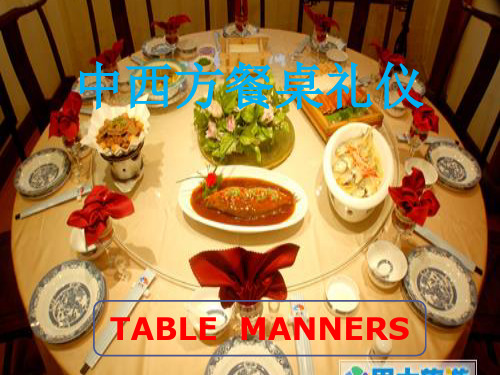
入座位置
In CHINA
客齐后导客入席,以左为上,视为 首席,相对首座为二座,首座之下 为三座,二座之下为四座。
IN WEST
一般说来,面对门的离门最远的那个座位是女主人的,与 之相对的是男主人的座位。女主人右手边的座位是第一主宾 席,一般是位先生;男主人右边的座位是第二主宾席、一般 是主宾的夫人。女主人左边的座位是第三主宾席,男主人的 左边的座位是第四主宾席。
先长者入座,客人依次入座; • 入座时要从椅子左边进入,入座后不要动筷子,更不要弄 出什么响声来,也不要起身走动;如果有什么事要向主人打 招呼 。
•
YOU should have a good posture.
•入座后姿式端正,脚踏在本人座位下,不可任意伸 直,手肘不得靠桌缘, 或将手放在邻座椅背上。
西方进餐礼仪
——面包篇
•位置:
通常主菜未上桌前,服务生会先提供餐包,放的 位置一定是在主菜左侧,所以餐具左侧的面包是属于 你的,不要拿错。吃面包时,直接在面包盘上剥开、 涂抹奶油,否则离开面包盘,面包屑容易掉得满桌都 是,不易收拾法:
Break the bread with your fingers into small piece small enough for one bite, butter it 用手指把面包一小块的撕开 来, 涂黄油
西方进餐礼仪
——餐巾篇
• 餐巾万一不小心滑下去怎么办?
西方进餐礼仪
——餐巾篇
• 想擦嘴时该怎么办? 错误:用纸巾擦。 正确:Use the napkin to gently wipe your mouth. Don’t blow your nose into your napkin 餐巾只用作轻擦嘴边。不可用来
餐桌上的礼仪用英语介绍
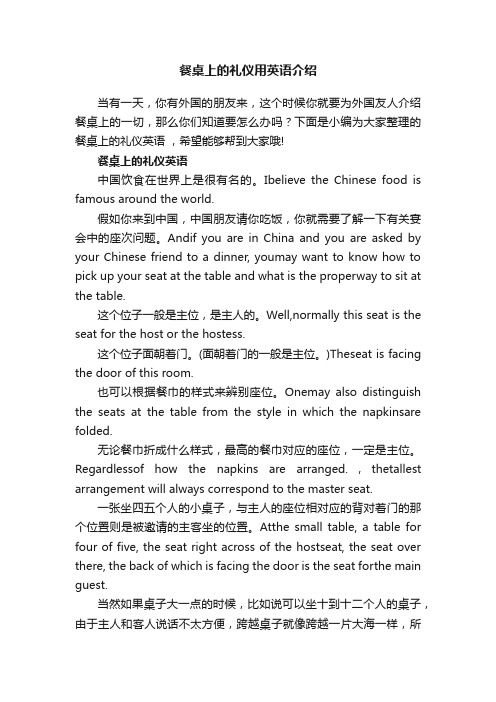
餐桌上的礼仪用英语介绍当有一天,你有外国的朋友来,这个时候你就要为外国友人介绍餐桌上的一切,那么你们知道要怎么办吗?下面是小编为大家整理的餐桌上的礼仪英语,希望能够帮到大家哦!餐桌上的礼仪英语中国饮食在世界上是很有名的。
Ibelieve the Chinese food is famous around the world.假如你来到中国,中国朋友请你吃饭,你就需要了解一下有关宴会中的座次问题。
Andif you are in China and you are asked by your Chinese friend to a dinner, youmay want to know how to pick up your seat at the table and what is the properway to sit at the table.这个位子一般是主位,是主人的。
Well,normally this seat is the seat for the host or the hostess.这个位子面朝着门。
(面朝着门的一般是主位。
)Theseat is facing the door of this room.也可以根据餐巾的样式来辨别座位。
Onemay also distinguish the seats at the table from the style in which the napkinsare folded.无论餐巾折成什么样式,最高的餐巾对应的座位,一定是主位。
Regardlessof how the napkins are arranged.,thetallest arrangement will always correspond to the master seat.一张坐四五个人的小桌子,与主人的座位相对应的背对着门的那个位置则是被邀请的主客坐的位置。
Atthe small table, a table for four of five, the seat right across of the hostseat, the seat over there, the back of which is facing the door is the seat forthe main guest.当然如果桌子大一点的时候,比如说可以坐十到十二个人的桌子,由于主人和客人说话不太方便,跨越桌子就像跨越一片大海一样,所以他们可以挨着坐,这种情况下是可以挨着坐的,这样坐主人和客人说话更方便一些。
中国餐桌礼仪英文
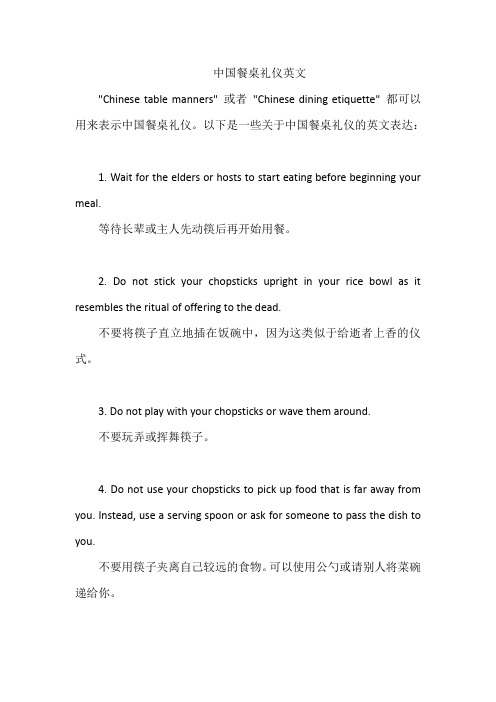
中国餐桌礼仪英文"Chinese table manners" 或者"Chinese dining etiquette" 都可以用来表示中国餐桌礼仪。
以下是一些关于中国餐桌礼仪的英文表达:1. Wait for the elders or hosts to start eating before beginning your meal.等待长辈或主人先动筷后再开始用餐。
2. Do not stick your chopsticks upright in your rice bowl as it resembles the ritual of offering to the dead.不要将筷子直立地插在饭碗中,因为这类似于给逝者上香的仪式。
3. Do not play with your chopsticks or wave them around.不要玩弄或挥舞筷子。
4. Do not use your chopsticks to pick up food that is far away from you. Instead, use a serving spoon or ask for someone to pass the dish to you.不要用筷子夹离自己较远的食物。
可以使用公勺或请别人将菜碗递给你。
5. Chew with your mouth closed and avoid making loud noises while eating.咀嚼时闭上嘴巴,避免发出大声的咀嚼声。
6. Do not blow on your food to cool it down as it is considered impolite.不要对着食物吹气以使其冷却,这被认为是不礼貌的行为。
7. Do not talk while having food in your mouth.嘴里有食物时不要说话。
九年级英语作文中国餐桌礼仪
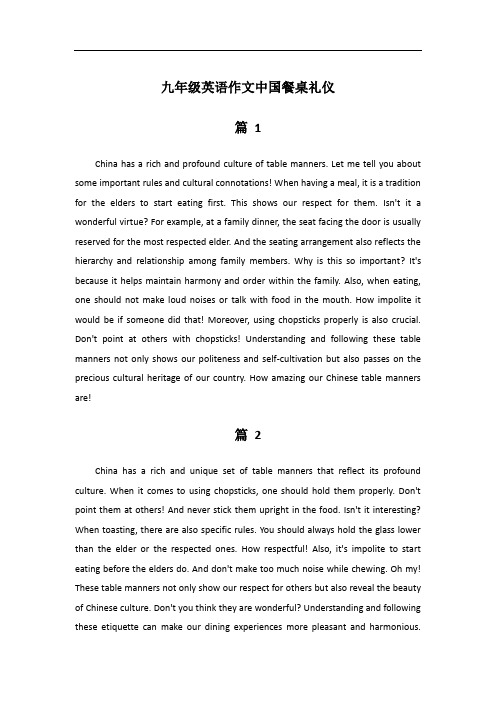
九年级英语作文中国餐桌礼仪篇 1China has a rich and profound culture of table manners. Let me tell you about some important rules and cultural connotations! When having a meal, it is a tradition for the elders to start eating first. This shows our respect for them. Isn't it a wonderful virtue? For example, at a family dinner, the seat facing the door is usually reserved for the most respected elder. And the seating arrangement also reflects the hierarchy and relationship among family members. Why is this so important? It's because it helps maintain harmony and order within the family. Also, when eating, one should not make loud noises or talk with food in the mouth. How impolite it would be if someone did that! Moreover, using chopsticks properly is also crucial. Don't point at others with chopsticks! Understanding and following these table manners not only shows our politeness and self-cultivation but also passes on the precious cultural heritage of our country. How amazing our Chinese table manners are!篇 2China has a rich and unique set of table manners that reflect its profound culture. When it comes to using chopsticks, one should hold them properly. Don't point them at others! And never stick them upright in the food. Isn't it interesting? When toasting, there are also specific rules. You should always hold the glass lower than the elder or the respected ones. How respectful! Also, it's impolite to start eating before the elders do. And don't make too much noise while chewing. Oh my! These table manners not only show our respect for others but also reveal the beauty of Chinese culture. Don't you think they are wonderful? Understanding and following these etiquette can make our dining experiences more pleasant and harmonious.Isn't that amazing?篇 3China has a rich and diverse culture, and its table manners are no exception! When it comes to having a meal in China, there are several important rules to follow. Firstly, it's essential to avoid making loud noises while eating. Imagine how unpleasant it would be if someone was shouting during the meal! This helps maintain a pleasant dining atmosphere.For example, when having a family dinner, children are often reminded to speak softly and not to disturb others. Also, the interaction between the host and the guests is of great significance. The host usually shows hospitality by offering the best dishes to the guests and making sure everyone is comfortable. And as a guest, it's polite to express gratitude and appreciation.Isn't it amazing how these simple rules contribute to a harmonious dining experience? Remembering and following these table manners not only shows respect for others but also reflects our own good upbringing. So, let's always keep them in mind and enjoy our meals in a civilized and pleasant way!篇 4China has a rich and diverse culture, and its table manners are no exception. Table manners in China not only reflect politeness but also carry profound cultural values.In family gatherings, for instance, elders are usually seated first as a sign of respect. It is polite to wait for everyone to be seated before starting to eat. During the meal, it is important to use chopsticks properly and not to make loud noises. Sharing food and showing care for family members enhance family bonds and create a warm atmosphere. How wonderful it is to have such a tradition that brings thefamily closer together!In business banquets, the table manners are even more crucial. Arriving on time and greeting the hosts politely show respect. During the meal, proper communication and avoiding topics that might cause discomfort can promote a pleasant atmosphere and facilitate cooperation. Don't you think these etiquettes are essential for a successful business interaction?In conclusion, Chinese table manners are not just about rules but a reflection of our culture and values. They help us build better relationships and create a harmonious society. Isn't it amazing how such simple acts can have such significant meanings?篇 5China has a rich and diverse set of table manners that reflect its deep cultural roots and values. In formal settings, the rules of table etiquette are strictly followed. For instance, when having a business dinner, it is considered impolite to start eating before the host. One must wait until everyone is seated and the host gives the signal to begin. The use of chopsticks also has specific rules - they should not be pointed at others or used in an improper way. This strictness in table manners shows respect and formality.During traditional folk festivals, there are special table manners too. Take the Spring Festival as an example. It is a custom to let the elders start eating first as a sign of respect for their wisdom and experience. Also, certain foods are eaten for their symbolic meanings, bringing good luck and fortune for the new year. Isn't it wonderful how these table manners connect us to our traditions and heritage? They not only shape our behavior but also pass on our cultural essence from generation to generation. So, let's cherish and follow these precious table manners!。
- 1、下载文档前请自行甄别文档内容的完整性,平台不提供额外的编辑、内容补充、找答案等附加服务。
- 2、"仅部分预览"的文档,不可在线预览部分如存在完整性等问题,可反馈申请退款(可完整预览的文档不适用该条件!)。
- 3、如文档侵犯您的权益,请联系客服反馈,我们会尽快为您处理(人工客服工作时间:9:00-18:30)。
中国餐桌礼仪英文中国餐桌礼仪用英文来解释应该怎么说呢?小编整理了几篇关于中国餐桌礼仪的的英文版,感兴趣的可以看一下!中国餐桌礼仪英文英文描述中国餐桌礼仪中国饮食在世界上是很有名的。
I believe the Chinese food is famous around the world。
假如你来到中国,中国朋友请你吃饭,你就需要了解一下有关宴会中的座次问题。
And if you are in China and you are asked by your Chinese friend to a dinner, you may want to know how to pick up your seat at the table and what is the proper way to sit at the table。
这个位子一般是主位,是主人的。
Well, normally this seat is the seat for the host or the hostess。
这个位子面朝着门。
(面朝着门的一般是主位。
)The seat is facing the door of this room。
也可以根据餐巾的样式来辨别座位。
One may also distinguish the seats at the table from the style in which the napkins are folded。
无论餐巾折成什么样式,最高的餐巾对应的座位,一定是主位。
Regardless of how the napkins are arranged。
,the tallest arrangement will always correspond to the master seat。
一张坐四五个人的小桌子,与主人的座位相对应的背对着门的那个位置则是被邀请的主客坐的位置。
At the small table, a table for four of five, the seat right across of the host seat, the seat over there, the back of which is facing the door is the seat for the main guest。
当然如果桌子大一点的时候,比如说可以坐十到十二个人的桌子,由于主人和客人说话不太方便,跨越桌子就像跨越一片大海一样,所以他们可以挨着坐,这种情况下是可以挨着坐的,这样坐主人和客人说话更方便一些。
But usually of course, when it s a bigger table, a table for ten or twelve, and it is not easy for host or hostess talking with the main guest, right across the table like right across the ocean and they can just sit side by side which can make it easier for them to talk。
对,它可以方便客人夹菜。
Yeah, this can make things easier for us。
因为在中国的宴席上,我们并不是谁点的菜谁吃。
Because in the Chinese way of having food,we don t order our own food。
而是为所有人点菜,大家一起分享食物。
We order for everybody and everybody shares the food on the table。
我们经常会采取桌上的人每人点一个菜的方式。
And usually we can have each of the people at the table to order one of the dishes。
那么如果我想吃的菜在桌子的另一边,比如说我想吃鸡肉,我就可以转动这个小桌子,让鸡肉转到我这一边来。
So what if something I want is on the other side of the table, for instance if I want the chicken, so I can turn the Lazy Susan and turn the chicken to my side。
这样不用站起来就可以够到菜,因为站起来夹菜是不礼貌的。
I can just pick it up without standing up and reaching out which is not proper or polite in Chinese table manner。
另外还要注意当别人夹菜的时候,这个时候你最好不要转动这个小桌子。
And of course when someone else picks the dishes you are not gonna turn the table at that time, turn lazy Susan at that time。
你知道为什么我坐在这儿而不是坐在那儿吗?And do you know why I just sit hear rather than there?因为坐在那儿的人要负责买单。
Because the one sitting there is gonna pay the bill。
中国的`宴席中一般都有敬酒的习俗。
Most Chinese people have the tradition of making toasts at banquets。
敬酒的顺序通常要按照年龄先长后幼、职位由高到低或者先主宾后次宾的顺序。
The order on the toast may be based on age from the eldest to the youngest by social position from high to low, or by guest status from principal to secondary。
只有充分考虑到敬酒的顺序,才能达到敬酒的效果,使大家皆大欢喜。
Only if the individual proposes the toast in a correct and reasonable manner, would the toast be well received and appreciated。
在宴席上饮酒的过程中,随时都可以敬酒,而且可以向同一个人多次敬酒。
One may propose a toast at any time throughout the meal, and making several toasts to one person is acceptable as well。
当杯中的饮料少于一半时,主人通常会为客人斟满。
If the guests glasses are less than half full, the host will help refill glasses for them。
斟酒的次序同敬酒的次序一样也是有长幼高低之分的。
The order in which this takes place is similar to that of proposing toasts, placing those of higher social status first。
在与长辈或地位高的人碰杯时,人们为了表示自己的谦虚和对对方的尊敬,往往会让自己的杯口低于对方的杯口。
When people make a toast to a person superior, they usually make sure that rim of their glass clinks at position lower than rim of the other person s glass, which expresses respect and modesty。
为了表示热情,主人通常还会不停地劝客人多吃一点。
To show good hospitality, the host usually urge the guest to eat more。
遇到孩子或者特别亲近的人,甚至还会亲自为客人夹菜。
For children, relatives or close friends, they will even serve the dishes themselves。
客人通常要友好地接受,并且表示感谢。
The guests are supposed to accept the serving and kindly show their appreciation。
即使遇到自己不喜欢吃的菜,也不要拒绝,放到自己盘子一边就可以了。
Even if they do notlike the particular dish, they do not refuse the serving as simply accept it and leave it at side of their plate。
另外,在中国的饭店吃饭可以不用另外付小费。
Eating in the restaurant in China, tips are not necessary。
干杯Bottom up!。
